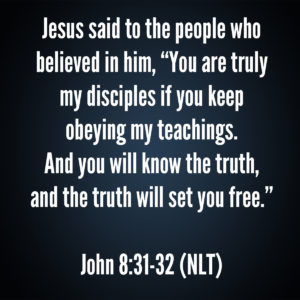Is Our Thinking Flexible or Rigid?

It is so easy to read scripture with a blank stare and think you have edified yourself with the word of God even though you don’t understand what God just spoke to you. Simply reading God’s word doesn’t change us until we have understanding and even then change doesn’t happen until we surrender to God’s will in the thing he is speaking to us about. There are a lot of religious people in the world who are fooling themselves that God loves who they are and what they live for.
Reading scripture is meant to do far more than just inform. It’s meant to help us to understand God’s ways and his thoughts so we can be like him. It is meant to set the structure of our lives by giving us clear goals and guidelines for which to live by but if we are reading without engaging our minds and hearts in order to “REASON” out what it says we merely fool ourselves into believing we are pleasing God.
Merriam-Webster dictionary says this about reason and its purpose:
“The purpose of using the faculty of reason is to arrive at a conclusion.” In other words, the real use of reason is to arrive at a solid explanation of the subject being investigating. God’s word challenges us to reason out what he is saying so that we don’t misunderstand him or miss what he is getting at. Remember, God spoke his word so we could live by it, not just read or memorize it.
So, if we are rightly using reason when reading scripture and we are investigating how and what God is speaking to us, it has the potential to change how we think and see life. Scripture says that God’s word is a light unto our path, which means scripture is designed to help us reason out the world we live in. If we read scripture only to use it to argue our point or argue down someone who thinks differently, we miss the point of reading the scripture. Reason should always help us to change for the better.
This brings me to something the apostle Paul said in the beginning of the book of Colossians about what he did for the saints he cared about. Paul says he always “Prayed” for the believers he was writing to. Unfortunately, we just hear Paul saying something nice in his greeting rather than Paul telling us what he thinks about the importance of prayer. How many times have we said to a person we cared about that we would pray for them when we were actually just trying to be nice, without any real meaning intended to cause us to actually prayer for that person. Saying I will try to remember you and your need in prayer should mean I will take decisive action to help change things. Saying we will pray should mean more than just saying something nice without any of intention to intercede. When we say things that are devoid of meaning God does not look favorably upon us.
Colossians 1:3
We give thanks to God, the Father of our Lord Jesus Christ, praying always for you,
So, if we reason out what Paul is saying, we have to conclude he believed the following, meaning he actually lived by the words he said, not just some warm fuzzy feeling.
1- People can use prayer to help them in their walk with God.
2- Prayer makes a difference.
Modern theology says God is in control of everything in our lives and whatever happens he has “Predestined” to happen. Modern theology is more often than not about feeling something rather than doing something that changes things for good and the will of God. Modern theology has built a mountain of ideas that go nowhere, instead of ideas that will change us and those around us. Religion is so insidious in that it dresses up like real life when in truth it is only about pretending to know God and be changed by that knowledge. If we are honest with ourselves, we have to ask ourselves about the subject of prayer and ask if we really believe prayer changes things or if we just like to pretend about prayer?
The problem with modern theology is that it boasts greatly in God while denying the power to walk in his image and change things around us for the better. If we are made in the image of God, then we have similar characteristics, though to a lesser degree, than God. He can create and so can we. That creative ability is the very essence by which we change things and that means God allows us to change our world, whether in the small things or the big things, through prayer. If we can not change things, then our world is not as controlled by God as we might think because God’s word challenges us to pray about everything.
Philippians 4:6
Be anxious for nothing, but in everything by prayer and supplication with thanksgiving let your requests be made known to God.
Back to the idea that prayer changes things. It is often hard to keep a strong hold on the biblical idea that prayer changes things. We generally don’t see well into the spirit world around us only the natural world and even in that we are so limited. One persons sees in their minds eye a pile of rocks and sees what could be faith. The. Other person sees a pile of rock and just shakes their head what a waste of space those rocks are and see only a problem. Prayer is the vehicle by which the child of God learns to understand the world though God’s eye and thus become a created force in the world for the kingdom of God. Prayer is meant to help us see what could be rather than just see the world as it appears to be. That my friend is what Paul said when he prayed for the people in the church in Colossians.
If I believe that I can change things in life by what I do and that includes prayer then I will engage in using my choices and actions accordingly including utilizing prayer. If on the other hand I believe prayer is mostly a nice “Feeling Thing” or as some preachers will teach that prayer is only there to change our attitude nothing more then I will engage in prayer in a half hearted way at best with no real passion to change things.
Questions:
1) What do you really believe about prayer? Is it just a religious exercise or could it be a mighty force for God in this world?
2) You can reason out what you believe about prayer by how much you engage in the practice. What will you do about what conclusion you come to?
Learning to think biblical – with reason!
Pastor Dale




Leave a Comment